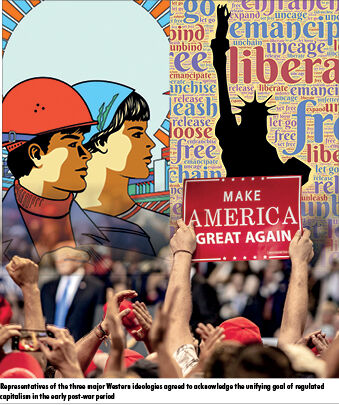Evanescing force?
In sync with changing socio-political and economic contexts, ‘ideology’ — as a political force — has manifested itself in newer forms; its end remains an illusion

An ideology is a set of ideas or ideals that form the basis of a political society. Based on their social circumstances, people tend to choose their own action-oriented ideology to follow, which organises their overall life. For more than 200 years, political ideology has been an integral part of the world history. Ideology arose from the economic, social, and political upheavals that shaped the modern world, and it has remained central to the ongoing process of social transformation and political evolution. Although ideology first developed in the industrialising West, it has since spread over the world, resulting in a global language of political discourse. However, opinions on the role of ideology in human history have been sharply disputed. Is ideology serving the cause of truth, development, and justice, or is it creating erroneous and blinkered worldviews that lead to prejudice and oppression? Furthermore, do ideologies still fundamentally organise the socio-political lives of every society, or are they gradually losing their significance in a society that is emerging to exist across multiple ideologies? With the establishment of a broad ideological consensus among major parties, the idea of the "end of ideology" emerged in the 1950s and 1960s by Daniel Bell, and has been in and out of debates ever since. However, to claim that ideology as a political force has come to an end now would be quite a presumptuous statement considering how impossible it is to do away with politics in very basic, day-to-day life.
The suspension of ideological debate was the process to which Bell drew attention, rather than the 'death of ideology.' Representatives of the three major Western ideologies — liberalism, socialism, and conservatism — agreed to acknowledge the unifying goal of regulated capitalism in the early post-war period. This purpose, on the other hand, was ideological in nature, reflecting a long-held confidence in market economics, private property, and material incentives, balanced by a belief in social welfare and economic intervention. As a consequence, a "welfare capitalism" or "social democracy" philosophy had triumphed over its contenders, though the victory was only temporary.
In the contemporary world, the relevance of ideology has shifted to concerns about ethnicity and identity, rather than the function of government in the economy. As a result of the current global economic crisis, ideological debates have resurfaced. It has reignited ideological arguments about the governments' role in the economy — demonstrating that ideology will continue to play a fundamental role in economic and political life.
The post-modern world today focuses on the idea of development. A developed society is something every state aims for in order to establish power on the global platform. While "ideology" is something highly political, "development" has often been seen as an "apolitical" concept. The idea of development was marked as inclusive and not in relation to any ideological agenda. However, what is this development that every society wishes to focus on? In a society with a diverse population comprising people from across cultures, social groups, and classes, it would be a misinformed opinion to separate ideology from the idea of development. Development, in some form or another, tends to represent ideas of society's dominant class. As a result, development will take place only from the perspective of a few particular sections. That being said, the ideas of the ruling class that have the tendency to become ruling ideas will eventually become the foundation of any form of developmental strategy and action. How can one dismiss the role of ideology in forming the very basic structure of a rigidly functioning community in this era of incredibly idea-driven nation-building?
The proponents of the decline-of-ideology concept have neglected to conduct a thorough examination of the period's political, economic, and ideological tendencies. They were mistaken in predicting that Marxism and radical ideologies would lose their ability to drive people. They were also mistaken in their forecast that the two major ideological systems would merge. They failed not only to provide an analysis of the period's political, economic, and ideological movements but also a comprehensive examination of ideology as a concept. Though it is fair to claim that new cross-cutting ideologies have been emerging today, the concern for an end to ideology altogether is not very rational. Ideologies are simply ideas and beliefs that people will carry from generation to generation. Perhaps, there will be a time when it won't be the centre-force for every aspect of social, political, and economic life. However, that day is far, far away from today.
Views expressed are personal



